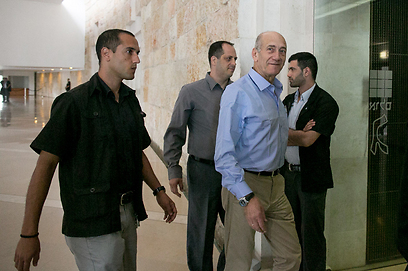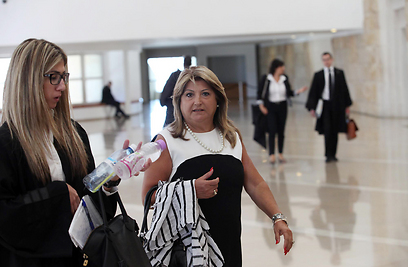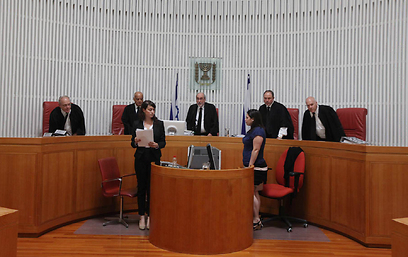
Appeal on Olmert acquittal to 'correct message to public'
Special panel of 5 judges discusses State claims against District Court rulings. State prosecutor asserts appeals necessary for public trust, Olmert speaker says prosecution should internalize criticism on its conduct
In addition, the State prosecution also appealed the acquittal of Shula Zaken in the Rishon Tours case.
Related Stories:
- Olmert exonerated of corruption charges
- Holyland case: State's witness fails to implicate Olmert
- Olmert considers political comeback
The appeal was discussed by an expanded panel of five Supreme Court justices, presided by Supreme Court President Judge Asher Grunis. Five more senior justices, who were supposed to take part in the appeal due to their seniority, requested exemption due to their familiarity with different people involved in the cases.
State Prosecutor Naomi Granot claimed that Olmert took advantage of his role, authority and status in order to obtain significant benefits throughout the years. "A particularly serious element in these cases is the misuse of his closest work environment; female civil servants who worked closely with him are the mediators for these benefits. This was determined by the court, despite the acquittal."

Olmert entering court (Photo: Ohad Zwigenberg)
In reference to the Talansky case, Granot said that Olmert must prove "that every single shekel or dollar was indeed spent on political purposes." She added that even if he does so, it would still not legitimize his behavior.
In reference to the Rishon Tours case, Granot explained: "A person knows well how to support himself. He knows how to sponsor his lifestyle and specifically his private expenses…The question is whether there is any doubt that for years there has been fraud by elected officials, when he's the sole beneficiary, when those who commit the fraud freely and openly communicate with him…When he himself is not paying one single shekel from his pocket to the Rishon Tours agency."
Granot said that the appeals against Olmert's acquittals and sentence are aimed at correcting the message to the public: "In all of these cases, the factual ordains are very severe, but in the public view the cases ended with a whimper, that these are light and forgivable behaviors. We want to correct that message."
Attorney Aryeh Peter from the State's Prosecutor Office explained that in the Rishon Tours case there is no dispute about the facts, but about the interpretation given to them by the District Court.
In further reference to the Rishon Tours case, Granot claimed: "There is a dissonance between the factual rulings of the District Court and the legal debate. The court ignored Olmert's misbehavior again and again, and did not deal with the main issue: He received tens of thousands of dollars from a private individual." In her opinion, accepting the money alone is a criminal offense.

Zaken in court (Photo: Gil Yohanan)

Supreme Court judges (Photo: Gil Yohanan)
The justices asked whether accepting the money is sufficient for a conviction of breach of trust, and Granot affirmatively replied: "As long as this contribution was not given by a cousin, not given in circumstances of a close friendship, as long as it was given in reference to the respondent's role as a Knesset member, and when the defendant of course knows it was given to him for that reason, then absolutely yes. It is an offense of fraud and breach of trust."
Amir Dan, Olmert's media adviser, said that after three senior judges "examined every detail and every claim for four years, and unanimously ruled that he is acquitted from all of these affairs, and that an Israeli prime minister was forced to step down for no reason, it is only appropriate for the prosecution to bow its head before the court and internalize the criticism on its conduct."
Supreme to overturn District?
In July 2012, the District Court unanimously acquitted Olmert in the Rishon Tours and Talansky cases. He was convicted of breach of trust in the Investment Center case. Generally, the Supreme Court rarely intervenes in the rulings of a lower court, but when the dispute revolves around the legal meaning of proven facts, it discusses them as any other instance.
Therefore, the State Prosecution believes that in the "cash envelopes" affair, where the significance of the facts and not the facts themselves were the cause for the acquittal, there is a good chance that the Supreme Court would overturn the District Court ruling.
The prosecution claimed that the principle behind the appeal in the Talansky case is a fundamental error of the court, that determined there is no offense of fraud or breach of trust even though the elected public servant received tens of thousands of dollars, mostly in cash; he deposited some or all of it in a secret fund together with other large deposits; did not report to anyone; and furthermore, gave false and lacking affidavits to the state comptroller. The prosecution claimed that the District Court's ruling gave no consideration to the fierce conflict of interests that Olmert had with Talansky.
In regards to the Rishon Tours case, the prosecution claims that it is impossible that Olmert did not know of the double funding of his trips and the $92,000 surplus obtained due to that, while he did not pay for his personal trips for years. The prosecution also claims that the District Court's ruling that there is reasonable doubt to Olmert's knowledge is not logical, and so is the court's ruling that Shula Zaken and another office worker committed fraud alone.
The response filed by Olmert's attorneys to the court read that the verdict was unanimous and justified, reasoned and detailed, and that the State's decision "extremely deviates from its narrow course of judgment when it reflects whether to appeal a verdict of acquittal, and specifically one given unanimously by an expanded bench of three justices."
- Receive Ynetnews updates directly to your desktop










